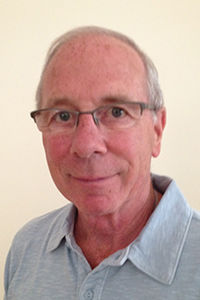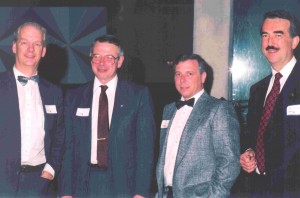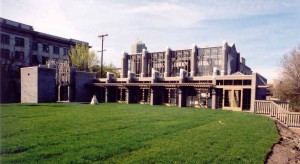
Dr. Richard Beauchamp, MD’71 was the third President of the UBC Medical Alumni Association (MAA), established in 1984 by a group of alumni committed to creating a building specifically for medical students to form connections and sense of belonging. The UBC Faculty of Medicine Alumni Engagement Office recently reached out to Dr. Beauchamp to hear his recollections of the Medical Student and Alumni Centre (MSAC) and the early days of the MAA.
Passersby often look at the building on the northeast corner of Heather Street and West 12th Avenue in Vancouver with curiosity. This low, stone building situated among tall, glass research centres and hospital buildings, is the MSAC, an integral part of the UBC medical school experience for over 30 years.
Dr. David Hardwick, MD’57, LLD’01, a pediatric pathologist and professor, special advisor, and alumnus of the UBC Faculty of Medicine for more than 60 years, spearheaded the idea of creating the MSAC. He recognized the importance of social and recreational space for students to build belonging and community, and felt alumni had the responsibility to making a lasting impact on the lives of students. In the early 1980s, Dr. Hardwick recruited alumni to join him in this endeavor, including Dr. Richard Beauchamp, MD’71, a budding pediatric orthopaedic surgeon at that time.
“A core group of alumni would meet in the Vancouver General Hospital Heather Pavilion cafeteria and kind of became a family,” Dr. Beauchamp recalls. “We were a very collegial group. I think that’s why we were successful in building the MSAC.” This group included Drs. Curtis Latham, BA’58, MD’62, Chuck Sloneker, William Webber, MD’58, LLD’00, Hardwick, and himself, and in 1984, MAA was established to formalize this group of alumni volunteers. While Dr. Beauchamp was the third President of the UBC MAA, there was no hierarchy between this group of friends as they worked diligently to create the MSAC, emboldened by their passion to make a difference. Two important parts of this massive undertaking were money and the location. The MAA organized three highly successful fundraisers where over 20 students and alumni phoned alumni across British Columbia.

From left, Drs. David Hardwick, MD’57, LLD’01, William Webber, MD’58, Richard Beauchamp, and Curtis Latham, BA’58, MD’62
“I would get off work and we would get on the phones from 7 to 9 pm at the General Services Administration Building on Westbrook Mall and University Boulevard,” Dr. Beauchamp remembers. “Dr. Hardwick was cheerleading and rallying us on. It was a lot of fun.”
The phone fundraisers raised $160,000 in total pledges, equivalent to over $300,000 in 2021 terms, enough to construct Phase One of the building.
The other part of the equation was the location. At the time, alumni had few opportunities to visit the Point Grey campus after graduation. UBC Hospital was not built yet, so alumni would receive their training in hospitals in central Vancouver. The more accessible location was near Vancouver General Hospital (VGH), where most alumni were working after graduation. When the property at West 12th Avenue and Heather Street became available, Dr. Hardwick negotiated with VGH to lease the land. At groundbreaking, a research laboratory near the MSAC site wanted to expand their facilities and offered a room on the top floor for medical alumni and students. But the alumni group was adamant that the centre needed to be a self-contained, singular building, and the rest is history.
In 1990, the MSAC Vancouver grand opening included a ribbon cutting ceremony led by then Dean of the UBC Faculty of Medicine, Martin Hollenberg. “It was a sunny day and the grass was green. It was a wonderful feeling,” recounts Dr. Beauchamp.

MSAC Vancouver on opening day, March 17, 1990
During fundraising and construction, students did not know much about the MSAC. But as third and fourth year-students worked in their clerkships at VGH, the building’s exposure to the students grew and the building was more heavily used. In addition, MSAC became the space to hold Friday evening parties called “weepers,” leading to more interactions between students, residents and alumni.
The MSAC grew from there, with Phase Two of the building opening in 1996 creating a fitness gym and offices for staff, and in 2004, an underground locker room and a time capsule wall for medical classes to keep special memorabilia. As the MD program expanded to the distributed sites, the need to provide space for students in those areas also grew. In 2015 and 2017, the MSAC expanded to the Victoria and Prince George respectively, providing students in the Island Medical Program and Northern Medical Program access to space for non-academic activities.
Dr. Beauchamp, now retired and living between Galiano Island and Tsawwassen, is glad the MSAC exists for future generations of medical students. He grew up in Nelson, B.C. and remembers feeling apprehensive about moving to Vancouver to attend medical school in 1967. His fears were alleviated as he quickly became friends with his classmates.
“At the time, our medical class was only 60 students,” Dr. Beauchamp recalls, “It was really easy to get to know one another as we spent most of our first and second years constantly working, studying and doing labs together.”
Today, the MSAC is a “home away from home” that allows thousands of medical students a greater opportunity to create connections with each other through social and recreational activities. And if the bonds between Dr. Beauchamp’s classmates is any indication (they recently celebrated their 50th anniversary with a virtual reunion with 36 classmates across Canada, the United States and Australia), future medical students can expect to form even stronger connections.
As a gym, student lounge, space for collaboration, place for students to flourish and create lifelong friendships, and so much more, the MSAC Vancouver is a vital part of the medical school experience and stands as a legacy to the cooperation between UBC students and alumni.
Comments are closed, but trackbacks and pingbacks are open.